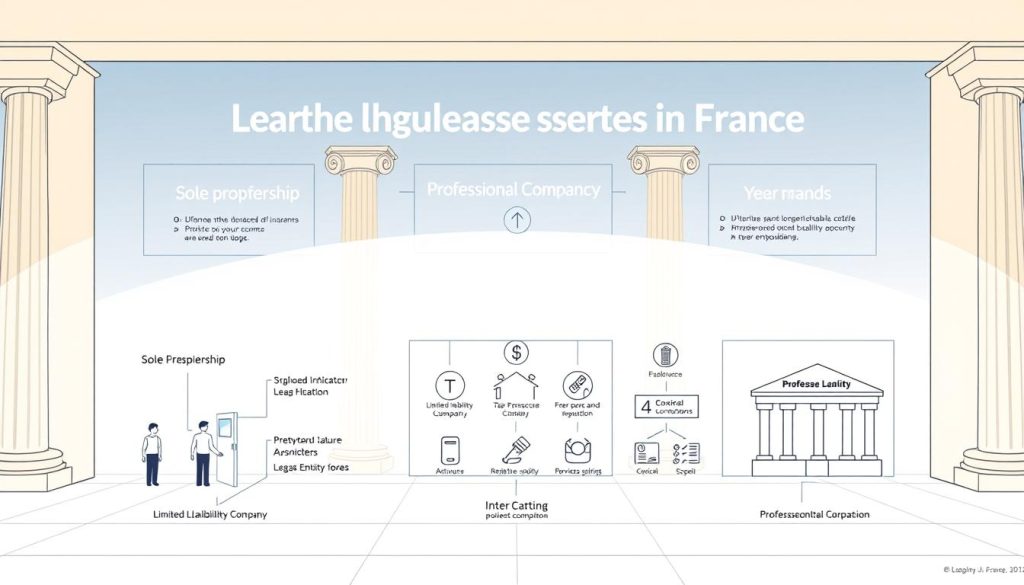What if your biggest financial hurdle as a freelancer in France could become your greatest advantage? With over 3 million independent workers shaping the nation’s economy—and 13% of the workforce now self-employed—mastering tax strategies isn’t just helpful. It’s essential for survival.
France’s freelance economy is booming, but its tax rules remain complex. The National Institute of Economic Statistics reveals a striking gender gap: 15.6% of men work independently compared to 9.5% of women. Yet all face similar challenges—from VAT rates to social charges.
We’ve created clear guidance to simplify your journey. You’ll learn how business structures impact your obligations and discover overlooked deductions. Did you know micro-entrepreneurs can’t deduct expenses, while others reduce taxable income by up to 34%?
Our approach combines compliance with smart planning. We’ll show you how the ACRE program slashes first-year social fees and why proper registration matters more than ever. No jargon—just actionable steps to protect your earnings.
Table of Contents
Key Takeaways
- France’s self-employed workforce grew to 13% by 2021, with significant gender disparities
- Tax obligations vary by business structure—micro-entrepreneurs face different rules than traditional freelancers
- Social charges include health insurance and pensions, calculated directly from business income
- ACRE program offers up to 50% reduction in social contributions for qualifying new entrepreneurs
- VAT rates range from 5.5% to 20%, depending on services rendered
- Proper expense tracking can legally reduce taxable income for non-micro-entrepreneur structures
Understanding the French Tax Landscape
France’s tax framework for independent workers combines mandatory contributions with strategic opportunities. Navigating this system requires understanding two pillars: income tax and social charges. Let’s break down how these elements interact in your daily business operations.
Overview of the French Tax System
Independent earners face a dual structure. Income tax applies progressively based on annual earnings, while social charges fund essential protections. The 22% social contribution covers healthcare, retirement savings, and sick leave. An extra 0.20% supports mandatory professional training programs.
Declaring revenue monthly or quarterly offers flexibility. This rhythm helps manage cash flow while meeting obligations. Accurate bookkeeping becomes critical—errors can trigger audits or penalties from French authorities.
Key Tax Obligations for Freelancers
Your primary responsibilities include:
- Timely revenue declarations through approved platforms
- Separating business and personal finances
- Maintaining deductible expense records (for non-micro-entreprise structures)
Social charges total 22.2% of declared income. While substantial, these payments secure access to France’s renowned healthcare system and future retirement benefits. Business owners should factor these costs into pricing strategies from day one.
We guide clients through this landscape with tailored tools. Our systems track deadlines, calculate payments, and flag potential savings. Proper planning transforms tax compliance from a burden into a strategic advantage.
Registering as a Self-Employed Professional in France
Launching your independent career in France begins with a critical choice that shapes your entire operation: selecting the right legal structure. This decision impacts everything from paperwork to personal liability and long-term growth potential.
Legal Structures: Micro-entreprise, EURL, and SASU
Three primary frameworks dominate the market. The micro-entreprise (auto-entrepreneur) suits those earning under €77,700/year for services. Its flat-rate taxation and simplified reporting attract 63% of new registrants annually.
EURL structures create a legal shield between personal assets and business risks. While requiring €150-€300 in setup fees, this model allows expense deductions unavailable to micro-entrepreneurs. « The separation of liabilities makes EURL ideal for high-risk sectors, » notes a Paris-based business advisor.
SASU registration (€300-€500) offers maximum flexibility for scaling operations. Though demanding detailed corporate bylaws, it permits shareholder dividends and attracts investors. Choose carefully—changing structures later triggers complex administrative processes.
Steps for Registration and Documentation
All paths start with Urssaf registration. Prepare:
- Valid ID and proof of address
- Detailed activity description (NAF code)
- Bank account for business transactions
Urssaf issues your SIREN/SIRET numbers within 15-30 days. These identifiers must appear on all invoices and contracts. First declarations typically occur 3 months after activation, aligning with France’s quarterly tax calendar.
We streamline this process through customized checklists and deadline tracking. Proper setup from day one prevents costly corrections and ensures compliance with evolving French regulations.
Tax Strategies for Self-Employed Professionals in France
Strategic tax planning transforms obligations into opportunities for growth. The French system offers distinct approaches based on your business structure and revenue levels.
Maximizing Deductions and Credits
Micro-entrepreneurs benefit from streamlined reporting. Your total revenue becomes personal income automatically—no separate corporate filings required. Consider this comparison:
| Payment Method | Best For | Key Benefit |
|---|---|---|
| Versement libératoire | Annual income >€10,777 | Fixed 2.2% income tax rate |
| Standard taxation | Annual income | Progressive rates from 0% to 45% |
Choosing the discharge payment option requires careful calculation. Those earning below €10,777 net often save more through standard deductions.
Understanding Income Reporting and Social Charges
Social contributions fund vital protections while reducing taxable income. The 22% rate includes:
- Healthcare coverage (55% of total)
- Retirement pension accrual (30%)
- Professional training funds (15%)
Quarterly declarations help manage cash flow effectively. We recommend aligning payment dates with client invoices to maintain liquidity. Proper timing prevents unexpected shortfalls while meeting all business obligations.
Our team analyzes individual circumstances to optimize both tax efficiency and benefit access. « Balancing immediate savings with long-term security creates sustainable success, » explains a Paris-based financial advisor.
Liability Insurance and Business Protection

Operating without proper safeguards could expose your livelihood to unforeseen risks. While French law doesn’t mandate coverage for all freelancers, liability insurance often becomes the shield between stability and financial disaster.
Why Coverage Matters
Builders and healthcare workers face strict insurance requirements—but even consultants and designers benefit from protection. A single client dispute or copyright claim can threaten personal assets without professional liability insurance.
Micro-entrepreneurs face heightened vulnerability. Unlike incorporated businesses, your personal property remains exposed to business debts. Consider these steps:
- File a déclaration d’insaisissabilité to protect your home
- Maintain separate business/personal bank accounts
- Review sector-specific requirements monthly
Vehicle users face additional rules. Commercial auto coverage becomes mandatory if you transport clients or equipment. Our team analyzes your workflows to identify hidden risks—like a photographer’s gear or a tutor’s home office setup.
Balancing legal obligations with smart protection creates lasting security. As one Parisian web developer notes: “My insurance covered a data breach claim that could’ve bankrupted me. It’s not just compliance—it’s peace of mind.”
Managing Income, Expenses, and Tax Deductions
Effective financial management separates thriving independent workers from those struggling to stay afloat. Clear systems for tracking earnings and costs create stability while meeting France’s strict reporting standards.
Recording and Reporting Your Income Accurately
Micro-entrepreneurs benefit from streamlined processes. Monthly or quarterly declarations through Urssaf’s portal take minutes when you maintain organized records. Every invoice must include:
| Required Element | Purpose | Consequence of Omission |
|---|---|---|
| SIREN Number | Legal identification | Invalid invoice |
| 30-Day Payment Terms | Cash flow protection | Delayed payments |
| Service Description | Audit compliance | Potential fines |
Automated tools sync bank transactions with declaration deadlines. This prevents last-minute scrambles before tax payments. « Proper documentation turns chaotic finances into actionable data, » notes a Lyon-based accounting specialist.
Leveraging Allowable Business Expenses
While micro-entrepreneurs can’t deduct operational costs, tracking them reveals growth opportunities. Consider these comparisons:
- Software subscriptions: Non-deductible but essential for efficiency
- Equipment purchases: Personal expense now, potential deduction if changing structures later
- Travel costs: Track mileage for future financial security planning
Detailed expense records simplify transitioning to EURL or SASU models. We recommend categorizing costs quarterly—this habit saves hours during annual reviews. Though immediate tax benefits don’t exist, strategic tracking builds foundations for long-term savings.
Balancing simplicity with thoroughness ensures compliance without burnout. Implement systems that grow with your work while protecting your most valuable asset: time.
Choosing the Right Legal and Insurance Options

Your business structure becomes your financial fingerprint in France—unique to your goals and risks. While 63% of new ventures start as micro-entrepreneurs, growing earnings often demand reassessment.
Micro-Entrepreneur vs Company Structures
The micro-entreprise suits simple operations with annual service revenue under €72,600. Beyond this threshold, French law requires transitioning to formal company structures. Consider these key differences:
| Structure | Liability | Setup Cost |
|---|---|---|
| Micro-entreprise | Unlimited | €0 |
| EURL/SASU | Limited | €150-€500 |
EURL and SASU models shield personal assets from business debts. Though requiring notary fees and detailed statutes, they allow expense deductions and investor partnerships. « Company structures future-proof your growth, » advises a Marseille legal expert.
Portage Salarial offers hybrid flexibility. By partnering with an umbrella company, you gain employee benefits while maintaining project autonomy. This plan costs 7-10% of monthly invoices but removes administrative burdens.
We help match your revenue projections and risk tolerance with optimal legal frameworks. Our analysis considers insurance needs, tax implications, and long-term scalability. Smart choices today create lasting security for your business tomorrow.
Navigating Social Security, Health, and Retirement Savings
France’s social safety net offers robust protections for independent workers – if you know how to activate them. Your mandatory contributions unlock access to healthcare, income protection, and retirement planning tools unavailable in many countries.
Breaking Down the 22% Social Charge
Every euro paid in social contributions builds your safety net. This mandatory 22% rate funds four critical areas:
| Component | Percentage | Key Benefit |
|---|---|---|
| Healthcare | 12.1% | 70% medical cost coverage |
| Retirement | 6.5% | Basic pension accrual |
| Family/Sick Leave | 2.4% | Paid time off after 1 year |
| Training | 1.0% | Professional development funds |
After 12 months of consistent contributions, you gain paid leave rights matching salaried employees. This includes 90 days of sick leave at 50% pay and parental benefits.
Optimizing Your Health and Retirement Plans
While the public system covers basics, many supplement with private health insurance. Providers like Allianz Care fill coverage gaps for:
- Dental and vision care
- Private hospital rooms
- Alternative therapies
For retirement, consider opening a Plan d’Épargne Retraite (PER). These tax-advantaged accounts let you invest contributions while lowering taxable income. « Combining mandatory and voluntary savings creates true security, » advises a Marseille financial planner.
France’s system covers 70% of medical costs – private insurance bridges the remaining 30% while offering enhanced services.
Annual contribution statements from URSSAF help track your benefits. Review them to ensure proper credit for healthcare access and pension calculations.
Leveraging Technology for Streamlined Tax Management
Modern solutions transform tax management from a chore into a strategic advantage. Digital tools simplify compliance while freeing time for core business activities. Over 72% of French freelancers now use specialized platforms to handle invoicing and deductions.
Essential Features of Financial Tools
Top platforms like MyAE.fr automate recurring tasks. These systems sync with bank accounts, track deductible expenses, and generate compliant invoices. Key benefits include:
- Automatic VAT calculations aligned with French rates
- Real-time payment tracking across multiple currencies
- Customizable templates meeting SIRET requirements
French banks like Qonto and N26 offer integrated business accounts. Their mobile apps scan receipts instantly, while AI categorizes expenses by tax type. This reduces errors during Urssaf declarations.
For complex cases, cloud-based systems provide audit trails. Detailed records prove invaluable during tax inspections. Explore financial security for independent workers through platforms offering encrypted data storage and role-based access.
Prioritize tools with multi-device access. Responsive website interfaces let you manage finances anywhere, turning downtime into productive time. Regular software updates ensure ongoing compliance with France’s evolving regulations.
FAQ
What tax deadlines do freelancers need to track in France?
Independent contractors must file income tax returns annually by May/June (paper) or June/July (online). Social charges like URSSAF contributions are typically paid monthly or quarterly, depending on your business structure. Missing deadlines can trigger penalties.
How do I choose between micro-entreprise and EURL for my business?
The micro-entreprise regime suits low-risk ventures with revenue under €77,700 (services). EURL offers liability protection and higher earning potential but involves complex accounting. Consult a chartered accountant to align your choice with financial goals and risk tolerance.
Is professional liability insurance mandatory for freelancers?
While not legally required for all sectors, liability insurance (RC Pro) is critical for consultants, IT experts, and healthcare providers. It covers legal fees, client disputes, and accidental damages—safeguarding both your assets and reputation.
Can I deduct home office expenses from my taxable income?
Yes, you can claim allowable expenses like rent proportionality, utilities, and equipment. Keep detailed records and use tools like QuickBooks or Zervant to track deductible costs. Mixed personal/business expenses require prorated calculations.
How does France’s social security system work for independent workers?
Freelancers pay social charges (up to 22% of net income) to access healthcare via CPAM, pension plans through CNAVPL, and unemployment benefits. Portage salarial offers a hybrid model with partial employee benefits while maintaining autonomy.
What tools help manage freelance taxes efficiently?
Use platforms like Shine for invoicing, Pennylane for accounting automation, and IRS-approved apps for expense categorization. These tools sync with French tax systems, ensuring accurate VAT calculations and real-time reporting.
Are retirement savings plans available for self-employed individuals?
Yes, options include PER (Plan Épargne Retraite) and Madelin contracts, which offer tax-deductible contributions. Allocate 5–10% of annual income to build a tailored retirement portfolio while reducing taxable income.
What documents are required to register as a freelancer in France?
You’ll need a valid ID, proof of address, RIB (bank details), and completed Cerfa forms (P0 or EIRL). Non-EU citizens must provide residency permits. Registration occurs via INPI or regional CFE portals within 8–15 business days.





